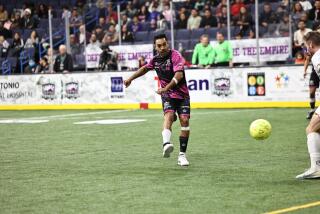A Wonderful Life : Sockers’ Branko Segota Finding Happiness in San Diego
SAN DIEGO — Branko Segota cruised up to a La Jolla sidewalk cafe in his shiny black Ferrari. Wearing a stylish European sweater and dapper shades, Segota chatted with some friends in his native language--Serbo Croatian. He was sipping cappuccino, taking in the sun’s warmth and reading a newspaper account of his goal-scoring exploits from the night before.
“I’ve never dreamed of things like this,” said Segota, who signed a three-year contract before the season worth about $600,000. “The only dream I’ve actually fulfilled was to buy the car. I bought the car because while I was growing up in Toronto, there were Ferraris. You could hear them coming down the block.”
Life is pretty darn good for Segota, the Socker midfielder who moved into second place on the Major Indoor Soccer League all-time scoring list Tuesday night with 545 points, passing his former New York Arrow teammate, Fred Grgurev. He moved a step closer to his longtime friend and former teammate, Steve Zungul of the Tacoma Stars, whose team will play the Sockers at the Sports Arena at 7:35 tonight.
All this, and Segota is only 26. Because he started playing professionally when he was 17, he has experience and maturity. But it is his powerful shot that makes him one of the MISL’s most dangerous offensive players.
“When he’s on form, I don’t think there’s a better player,” Socker Coach Ron Newman said. “As for the top offensive player, it’s a toss-up between him and Preki. Preki is very difficult to handle, but he doesn’t have the power of Branko.”
With 545 points on 305 goals and 240 assists, Segota trails Zungul (1,017 points) by 472 points.
Does Zungul think Segota can catch him?
“Why not?” said Zungul. “He’s young. He has plenty of time. He has to go after it. It’s up to him now. He has the advantage in that he started young at 17. And there are so many games today.”
How would the master feel if his pupil someday surpassed his scoring record? Would it bother him?
“No,” Zungul said. “Not at all. He’s my best friend.”
Zungul, who started playing professionally in the United States at 23, is 33, and his play has deteriorated because of injuries that have plagued him the past two seasons. Zungul says he’s taking it year-by-year and this could be his final season. Segota--second in the league in scoring to Preki’s 52 points with 27 goals and 15 assists for 42 points--hopes to play at least seven more seasons.
“I’m just concentrating on playing and doing well,” Segota said. “As long as we win, everything else is secondary. Right now, I’m just going to continue doing whatever we’re doing right. Hopefully, everything will fit in. I have time.”
Time and talent are two primary reasons why Grgurev is confident Segota will one day pass Zungul.
“I’m happy for him,” said Grgurev, who wasn’t aware that Segota had surpassed him until a reporter mentioned it in a Thursday interview. “By himself, he can decide a game better than any player. I think he’ll pass all the records because he’s young and good.”
Segota’s shot has been timed in practice at nearly 80 miles per hour. A Phoenix player once suffered three fractured ribs after getting in the way of a Segota shot.
“That speed (75-80 m.p.h.) was when I was tired and after practice,” Segota said. “During the games, if they could clock some of them, I’m sure they’d go faster. Everything is tense, and then all of a sudden out of nowhere you unleash this thing and they say, ‘Where the hell did that thing come from?’ ”
Segota remembers the first time he unleashed his shot. As a 15-year-old, he scored a goal from center playing with the Ontario Select Provincial team.
“It was a great feeling because you had a thing on everybody,” Segota said. “It’s like it doesn’t matter how far out I am, if the guy doesn’t cover me and I can get within 20 or 30 yards, boom! And if the goalie is not ready, it’s there.”
The Miami Dolphins even invited Segota to try out as a kicker when he was playing with the Fort Lauderdale Strikers. In addition to his power, Segota has excellent moves and great vision and can shoot quickly and accurately with both feet. Segota aims to nail his shots at an inch or half inch from the corner of the net.
“You don’t have that much room,” Segota said. “When you’re shooting from a longer distance, you can do more because the ball has time to curve. Indoor, it’s such a short spread and you have to worry about the small goal. You have to be very precise.”
If his shot or speed doesn’t cause a defender to back off, then there are his sharp and expertly used elbows to also contend with.
“He’s very strong and powerful,” said Crow, a teammate who has only guarded Segota in outdoor games when Segota was with the Golden Bay Earthquakes. “He uses those arms to turn on a defender. You can’t allow yourself to get so close he can turn. He’s one of those players you try to contain. If he gets a point or two, that’s OK. I don’t think you can stop a Branko Segota. You can try to contain him.”
OK, so now you have this picture of a flashy offensive superstar who drives a Ferrari and is going to turn Madison Avenue on its ears.
Not quite. First of all, indoor soccer and its players are still struggling to get national endorsements and media attention. Segota is a player, and not an entertainer, in a sport that encourages pregame laser shows and post-goal celebrations ranging from climbing the glass sideboards to throwing one’s jersey into the stands, a la last year’s scoring champion, Tatu of Dallas.
“I’m a soccer player,” Segota said. “I play soccer and I do it well. I don’t want to change my attitude. I’m not used to those lights and everything because I played outdoor all my life. I just can’t get into the habit to change.”
There are those who have suggested to Segota that it might be in his financial interest to become more charismatic.
“He doesn’t get that excited when he scores,” Newman said. “He doesn’t climb the glass like Preki or put his arms up (like Juli Veee). That takes away from his charisma. I wish he’d thought of taking his shirt off (like Tatu).
“It doesn’t hurt Branko’s performance. It hurts as far as promoting him. Look at what Tatu has done with his gimmick. If it comes out naturally, all right. If it doesn’t, it doesn’t.”
With Segota, it doesn’t.
“A lot of people say you have to come up with something, but I just can’t do it,” Segota said. “I tried one time climbing the boards, but I didn’t feel right. It’s not me. I can’t do it.”
That outburst came after Segota scored a goal in the Sports Arena during his first season with the Sockers in 1984-85. Since then, Segota is satisfied with hugging teammates and acknowledging the crowd after scoring a goal.
“If my stats don’t speak for themselves and if all the championships I’ve won (three with the Arrows and two with the Sockers) isn’t enough to get into Sports Illustrated, then I don’t want to get in there because I throw my jersey in the stands,” Segota said.
Call him stubborn, independent, cocky or confident, Segota is very much his own person. And he acts older than his age.
“From my early days with my brother (Romeo, 30), I always used to hang out with older people,” Segota said. “I was always with the elders.”
Said Grgurev, who roomed with Segota when Segota was 17 and first broke into the professional ranks with Rochester in 1979: “He was too mature for his age. He handled himself on the field with the ball like some veterans.”
In 1978-79, the inaugural year of the MISL, Grgurev played with Philadelphia and led the MISL in scoring with 46 goals and 28 assists for 74 points in 24 games. Zungul, playing with the Arrows, had 43 goals and 25 assists for 68 points in 18 games to place second in scoring. Segota had 25 goals and 22 assists for 47 points in 21 games to finish fourth. The Arrows beat Philadelphia to win the championship.
The next season, Zungul led the league in scoring with 136 points in 32 games. Grgurev of Philadelphia was second with 104 points in 31 games and Segota was third with 86 points in 31 games. The Arrows beat Houston in the championship series.
The three Yugoslavs were united in 1980-81, when Zungul led the league in scoring with 152 points in 40 games, followed by Segota with 83 points in 35 games. Grgurev finished in a sixth-place tie with Joe Fink of Philadelphia with 69 points in 37 games. The Arrows beat St. Louis to win the 1981 title.
“It was when we beat St. Louis (6-5) that Branko stepped out in front of everyone and showed his ability and character,” said Zungul, who added that’s when he really knew Segota would become a star.
“We were an awesome team,” said Grgurev, 36, who played for seven teams in nine seasons before retiring when the New York Express folded last season. “I would say we were the most dominant team in the history of the league. Not San Diego.”
The trio was broken up when Grgurev played for New Jersey in 1981-82 and Segota was sold by the Arrows to Fort Lauderdale for $300,000 in May 1981. Zungul and Segota were reunited with the outdoor Golden Bay Earthquakes in 1984 and again with the Sockers when Zungul, Segota and defender Fernando Clavijo were sold from the Earthquakes to the Sockers before the 1984-85 MISL season.
Zungul led the league in scoring with 136 points and Segota finished third with 106 points to help lead the Sockers to the championship.
The next season, Zungul had 29 goals and 34 assists for 63 points in 27 games before being sold to Tacoma midway through the season. Zungul led the league in scoring for the sixth time with 115 points, but the Sockers beat Tacoma in the semifinals of the playoffs and went on to defeat Minnesota for the title. Segota finished third in the league in scoring with 106 points, but he led the Sockers in scoring, won the championship and started the part of his career without Zungul as a teammate.
Segota and Zungul are best friends. Zungul calls Segota “Maci,” which means “little one” in Serbo-Croatian. Segota calls Zungul “Daddy.”
It wasn’t easy for Segota when the Sockers sold Zungul to Tacoma, but he says he told his teacher to go.
“We look at things logically,” said Segota, who represents himself in contract negotiations and has inherited Zungul’s business acumen. “You say, ‘Steve, you’re not getting any younger. You got a good deal.’ I said, ‘Steve, you’d be nuts. I’ll go tomorrow, you stay here. I’ll go.’ It was very hard for me, but you have to be honest with each other because we respect each other and want the best for each other. I hated to see him leave, but it was a very good deal for him.”
Segota credits Zungul with being a big influence in his life.
“He taught me to be a classy person,” Segota said. “To do things right. Not to get yourself in trouble. Be careful what you say. Always leave an impression . . .
“I think he was the biggest factor when I was growing up. Him and Popo (former Arrow Coach Don Popovic), they took me under their wing when I was 17. I was a little rough. I had the basic talent, but I didn’t have the cunning that Steve had. His sharpness and his desire and will to win. Slowly with the years, he’s taught me everything. How to become a consistent player and how to hate to lose.”
Segota has been known to relax his intensity after playing well. With increased maturity has come increased consistency.
“I’m very sensitive,” Segota said. “Sometimes if it’s not going well or you’re not getting the right passes and this and that, I would kind of go in a shell. With time and experience, I’ve learned to get out of those things. With Steve’s help mainly, because when things weren’t going for me, he’d talk me through them. Try this, try that. Go back to the basics. Don’t try to overdo it. Through the years, I’ve learned to do that on my own. Now I can pass that on to other players.”
Said Zungul: “Even today, Branko is still learning. He likes to listen. That’s good.”
This season, Segota is happier and more relaxed than last season when he was frustrated by the team’s lack of consistency and his own indecision about the future. This season, he is armed with a new lucrative contract, not sidelined by injuries the way he was last season and is the star on a team that is 17-6.
Midway through last season, a news conference was called to announce the signing of Segota to a six-year contract worth $1.25 million. About an hour before the conference, which Segota said he hadn’t agreed to attend, Segota phoned the Sockers to say the deal was off. Contract negotiations were on and off throughout the remainder of the season.
“I didn’t know where I was going and what was happening,” said Segota, who played for the Canadian national team in the 1986 World Cup and still had notions of playing outdoor soccer for an elite European team. His family moved to Canada when Segota was 7.
After vacationing during the summer in Canada and Yugoslavia, Segota returned to San Diego, ironed out the details of his contract and signed Sept. 8.
“I’ve seen the other places, man,” Segota said. “Can you imagine going to Wichita? I can’t imagine that.”
So, he stayed in San Diego, where he is planning to buy a house after he sells his town house in Florida. Segota would still like to play with the Canadian national team, and his Socker contract allows him to do so during the off-season, but the Sockers are his top priority.
San Diego’s 17-6 start has made the first part of this season particularly enjoyable for Segota. He especially enjoys working with the younger and newer Sockers such as fellow Yugoslavs Keder and Zoran Karic, both acquired this season.
“We’re having a lot of fun because we got some new faces,” Segota said. “It’s nice to see the faces of the players who come from other teams, where they did really badly. They’re loving it. Everybody is rowdy and everybody does things together. It’s like the team spirit is back.”
Segota passes on pointers to players and has been known to scream at teammates who continually make the same mistake, but he doesn’t consider himself a team leader. That is something he thinks he has to earn from his teammates.
“It’s not, ‘I’m going to become the leader. I’m Sitting Bull,’ ” Segota said. “No, you’ve got to earn that. If you do your job and you try to help the players and play for the team, everything will come. It’s up to other people to judge you, not for you to judge yourself.”
In Segota’s case, he has been judged: his teammates and opponents respect him. Fans also give him his due.
“I’m 26 years old,” Segota said. “To give up everything I have here would be dumb unless there was a big transfer fee (from an outdoor team). I would not go and try out now.”
There’s no reason to. Segota has found himself in San Diego.
MISL SCORING LEADERS
Player Current Team Games Goals Assists Points 1.Steve Zungul Tacoma Stars 339 607 410 1017 2.Branko Segota San Diego Sockers 235 305 240 545 3.Fred Grgurev Retired 327 331 213 544 4.Kai Haaskivi Cleveland Force 270 244 290 534 5.Stan Stamenkovic Baltimore Blast 228 217 280 497






